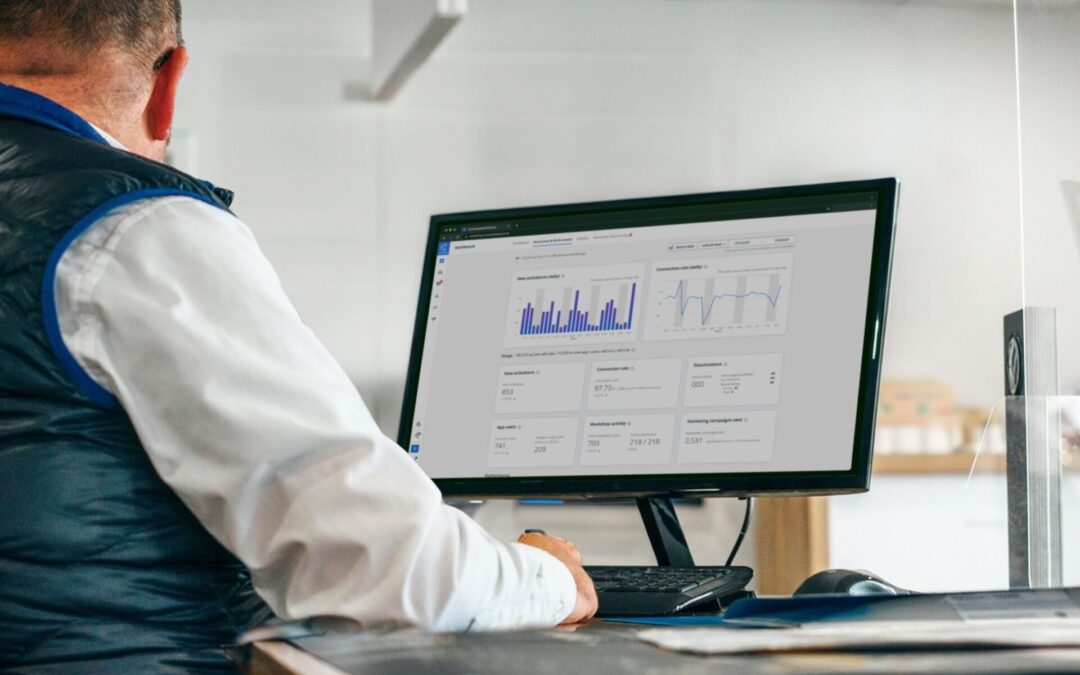Leasing companies are positioned right in the intersection of automotive innovation and customer-centricity. Customers get drawn in by the allure of vehicle leasing’s flexibility, cost-efficiency, and access to the latest automotive technologies. Securing such a diverse clientele, leasing companies are tasked with adapting to unique preferences, offering tailored solutions, and providing unparalleled customer service experiences. At the same time, they must diligently monitor the overall health of their extensive vehicle fleets.
In this dynamic landscape, leasing companies must find a way to navigate the balance between meeting the demands of their customer base and ensuring the residual value of their car park. Despite leasing’s advantages, there’s a gap in adopting a proactive, tech-based approach to meet clients’ changing preferences. The solution lies in a comprehensive, data-driven system that not only optimizes fleet management but also personalizes the leasing experience with predictive insights. Such a system is crucial for improving operational efficiency, lowering costs, and boosting service quality, while also catering to the increasing demand for sustainable vehicle options. Addressing this gap is vital for driving the industry toward innovation and enhanced customer satisfaction.
The intricacies of broad customer preferences
The surge in demand for Battery Electric Vehicles (BEVs) is growing. BEVs are forecasted to cover 20% of the market in 2025. This too shapes the strategy of leasing companies. They must adapt to a customer base increasingly inclined towards eco-conscious choices. At the same time they should also cater to those preferring Internal Combustion Engine (ICE) vehicles.

This evolution brings forth a new set of challenges for leasing companies. Different vehicles, whether electric or traditional, all come with different maintenance service intervals and factory warranty requirements. And it goes without saying that this information is crucial within the leasing industry.
The documentation process of important details such as the last service date, current mileage, and battery health is already a time-consuming task. With a growing number of customer vehicle preferences and varying contract specifications, the layers of complexity stack. Accurate record-keeping is indispensable for ensuring the profitability of leasing businesses. It directly impacts residual values, warranty compliance, and customer satisfaction.
The importance of accurate data
Accurate data is paramount when it comes to billing and payment. By this we mean the considerable variation in leasing contract terms, such as mileage allowance and pricing. Adding to that, the complex task of scheduling maintenance and repairs relies heavily on customers’ diligence in reporting issues and adhering to maintenance schedules.
Just to be safe, the leasing operations managers should be a step ahead already. Just in case the customer is not as diligent as you hope. Documentation takes on added importance in estimating resale values. Every data point, from mileage records to vehicle condition, significantly influences a vehicle’s worth at the end of a lease term.

However, the accuracy of the vehicle data is not solely about financial outcomes. Customer satisfaction should also be a paramount concern. Leasing companies understand that trust and positive relationships are fundamental to their business. By maintaining comprehensive records and sharing them with customers, they build trust, instill confidence, and nurture positive rapport.
Satisfied customers are more likely to return for future leases, creating a loyal client base that fortifies the company’s long-term success. In the competitive realm of vehicle leasing, meticulous documentation transcends its role as a routine task. It becomes a strategic imperative for securing profitability, compliance, and enduring customer loyalty. We also explore the many benefits of data in this article.
The missing link to leasing optimization
Now that we have established the importance of having access to accurate vehicle data, let us imagine ways of optimizing that process. The burden of documentation work would undoubtedly be lifted with some form of automation:
What if the vehicles let you know in advance when they require service or repair?
What if the vehicles themselves documented all the important incidents that happened to them?
All this and more can be solved with the connectivity concept, such as done by Connected Cars. The vehicle connectivity technologies of today have a razor-sharp focus on enhancing the longevity of cars. Specifically, by collecting relevant data in real-time. This increases the chance of warning lamps and service predictions reaching you well before any driver inaction causes the problems to escalate. Instead of manually keeping tab on different vehicles and customers, only the most relevant information gets highlighted to you. This enables you to work much more time-effectively.
A product created specifically for the leasing industry like ConnectedLeasing not only provides live vehicle data from all vehicle types including access to historic data. It also integrates seamlessly with the service partner you work with. This ensures a direct line of communication while also directing your customers the right way automatically whenever it is time for maintenance or repair.
Having all the vehicle data available, as well as guiding your customers in the right direction whenever an issue is detected, all helps establishing a great customer experience. All this results in great customer retention, and proactive handling of issues and service. The access to historic and live vehicle data also ensures easy documentation work. All of which help inform the vehicles’ residual values and drive the leasing company’s profitability.
Conclusion
To sum it all up, precise vehicle data is fundamental to the effective management of a leasing company’s fleet. It helps ensure fair and accurate transactions with customers, and supports compliance with industry regulations and standards. It plays a central role in determining lease terms, assessing risk, and maintaining the financial health of the leasing business. Adding vehicle connectivity to the company’s business strategy, it can be guaranteed that accurate live and historic data is always available, cementing the trajectory towards increased revenue.






